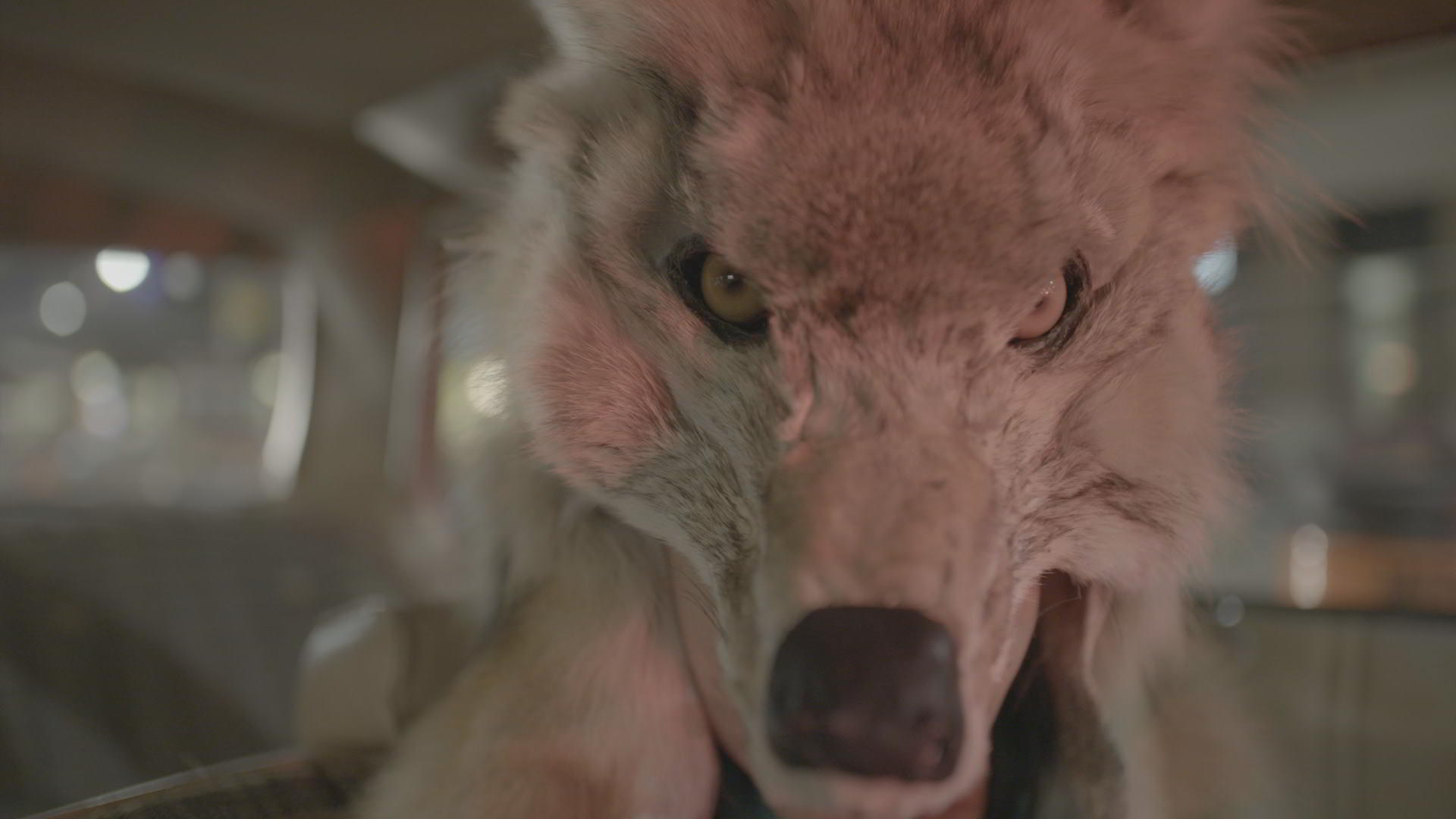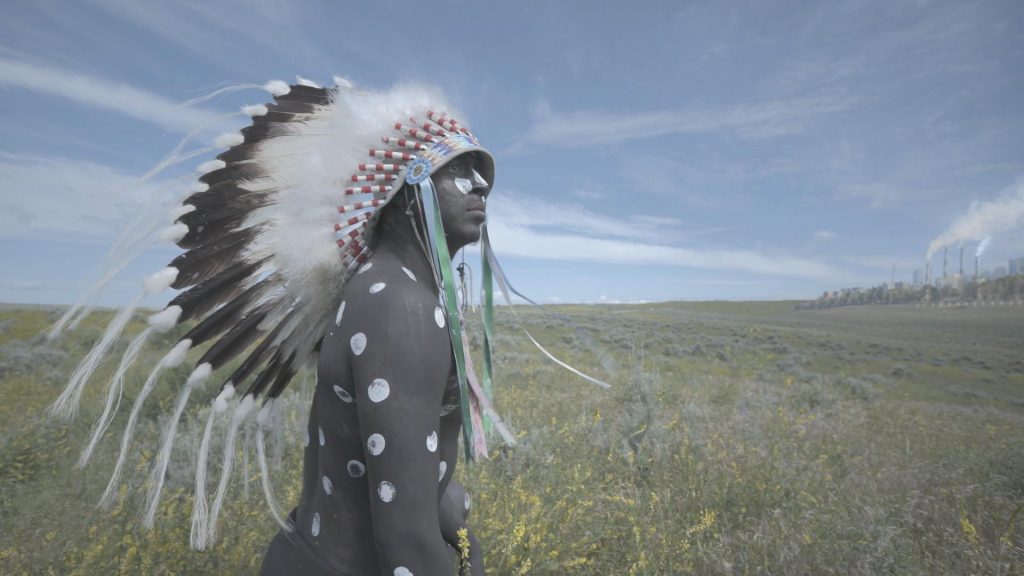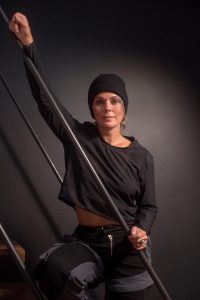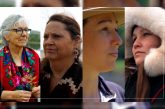
Still from Inconvenient Indian. Gail Maurice as Coyote | Image source: NFB
I want the film to be a provocation. I hope it unsettles audiences. I hope it asks audiences to look at their conscious and unconscious biases. I hope it celebrates Indigenous culture in a way that’s surprising and nuanced for people that might not have access to our communities in the same way as we do. – Michelle Latimer
Often times I hear settler people say that Indigenous people are stuck in the past, but usually, the opposite is true: Settler people often have dated (and racist) notions of what it means to be Indigenous. The Inconvenient Indian, directed by Michelle Latimer (Algonquin/Métis) and based on celebrated author Thomas King’s (Cherokee) book by the same name, premiering at TIFF 2020, negates these out-dated notions and celebrates Indigenous Peoples today. The Inconvenient Indian also sends a message that despite our resilience, colonialism still has a lingering effect and should not be disregarded for the sake of comfort.
Thomas King has a powerful and poetic way of getting this point across in his book. Filmmaker Latimer takes King’s written word to a whole new level through a cinematic storytelling experience. The cinematography is vibrant and varied reflecting the many rich Indigenous cultures throughout Turtle Island. Inconvenient Indian, the documentary is evocative and at times I found myself getting emotional while watching it. The story also has a flow to it that reflects the interconnectedness of our issues, cultures, and artistry by interweaving cringe-worthy historical portrayals of Indigenous people with powerful imagery of modern prosperous Indigenous art, resistance, and strength.
Leading up to The Inconvenient Indian Toronto International Film Festival premiere, MUSKRAT Magazine got to talk with director Michelle Latimer about her work on the film and what she hopes the audience takes away from watching it.
EC: I liked the film’s editing style, how it flowed, and organically circled back to certain stories. What inspired you to tell the story this way?
ML: I had read Thomas King’s book a few years before I started working on the film. Then Jesse Wente and Stuart Henderson, the producers, approached me to adapt it into a documentary. At first, I was intimidated because it seemed like such a dense and difficult book to adapt. I had just come off of doing Rise and spent months in the Standing Rock occupation. I saw a lot of Thomas King’s ideas in action at Standing Rock and just felt that I wanted to explore his themes further. When we were doing the Rise series, we were often chasing stories as the stories were unfolding on the ground as we went. This was different. I could take a step back and almost meditate on the ideas and think about how I wanted to present them. It was almost more like a poem or a piece of music rather than something journalistic.

In terms of the editing style, I would say that’s an extension of that. I worked closely with my editor Katie Chipperfield, so it was more of a collaboration between us. Just taking that time and thinking about rhythms, like the rhythm of storytelling. I wanted to honor the circular forms of oral storytelling we have in our communities. That became the structure for the film. Katie and I worked together before so she understood the material and we just began this very deep dive process of working together to craft a story where image was the most important thing, even over the words and using rhythm to punctuate that.
EC: You featured many prominent leaders within the Indigenous community. How did you decide who to put in?
ML: The process of making a film is a distillation of ideas and you never get in everything you’d like to get in. The leaders and artists that I profiled are only a small, small fraction of the amazing people we have across Turtle Island doing amazing work. I was looking thematically at the ideas in Thomas’s book and thinking about what scenarios would encapsulate those ideas visually. There were certain people whose work I’ve just been fascinated by for a long time. I had been a really big admirer of Skawennati and her work on Second Life in video game [production] at Concordia AbTeC. I came across her in the early 2000s and was just so impressed by what she and Jason Lewis were doing. They talk a lot around racism in technology, how to subvert that and change those structures. It felt like an area of expertise that I hadn’t heard about before. Another person that I just love is Alethea Arnaquq-Baril. I think she’s so brave and courageous in her work.
EC: Was there anything that you wanted to feature in the film, but didn’t work out?
ML: One of the things that did not end up in the documentary, which I was very sad about, was a repatriation from the Royal Ontario Museum to a community in Northwestern Ontario. It would have been the largest repatriation of sacred objects, human remains, and ceremonial items in the history of Canada. The timing just didn’t work out. It’s a very sensitive thing. This is over thirty thousand objects that were going to go from the Royal Ontario Museum back to be buried in this First Nation, and I was going to film the entire process from beginning to end. That repatriation got delayed, so we weren’t able to fit it into the production schedule of the film. They still have yet to do it. I wanted to film that because it was a perfect example of Thomas’s ideas.

EC: There are many truths spoken in the film. Was there anything that resounded with you the most?
ML: I honed in on Thomas’s idea that we can no longer feign or hide behind ignorance. I feel like even with the Truth and Reconciliation Commission and the apology, that the larger society believes that we’ve already dealt with it. We had the settlement for the residential schools. Let’s move on with it. Things are changing…The things we do now will affect the future we move into and we can’t feign ignorance. I don’t think we should settle. It’s like taking the accountability in the now and looking at the things we can do now actively. Not just reposting something on social media, but actively what can we do in our lives to make change that will create the future?
EC: What do you hope audiences take away from the film?
ML: I want the film to be a provocation. I don’t want people to walk away saying, “oh, I feel so much better and educated.” It shouldn’t be a feel-good, pat yourself on the back film because you saw something that was healthy food. I hope it unsettles audiences. I hope it asks audiences to look at their conscious and unconscious biases. I hope it celebrates Indigenous culture in a way that’s surprising and nuanced for people that might not have access to our communities in the same way as we do. We have so many amazing people doing incredible work. You know, it’s funny, my friend interviewed me the other day and he said, “I’ve read a lot about residential schools, but I’ve never seen footage from it.” I think when we see images reflected on screen, especially proper representations of our people in our community, it’s in direct opposition to the hundreds of years of misrepresentations. That can be a very powerful tool not just for change, but also for celebration, resurgence, and reclamation. I wanted to celebrate that resilience.
Inconvenient Indian will be screened at Toronto International Film Festival this Saturday, September 12.

BIO: Michelle Latimer is an award-winning filmmaker, producer, writer and activist. She is currently showrunning and directing the scripted series Trickster (Sienna Films/Streel Films/CBC), and has just completed production on the feature doc Inconvenient Indian (90th Parallel Productions/National Film Board of Canada/Crave), an adaptation of Thomas King’s book. In 2016, Michelle chronicled the Standing Rock occupation protesting the Dakota Access Pipeline, as part of the eight-part Indigenous resistance series RISE (Viceland), for which she was also the showrunner and director. RISE was awarded the Canadian Screen Award for Best Documentary Program in 2018. In 2020, Michelle was named the inaugural artist-in-residence at the Sundance Institute Screenwriting Labs and was awarded the Chicken & Egg Breakthrough Award, a prize given to five international filmmakers for their work in social-justice filmmaking. Michelle is of Algonquin, Metis and French heritage from Kitigan Zibi Anishinabeg (Maniwaki) QC. She grew up in Thunder Bay, Ontario and currently splits her time between there and Toronto, Canada.









